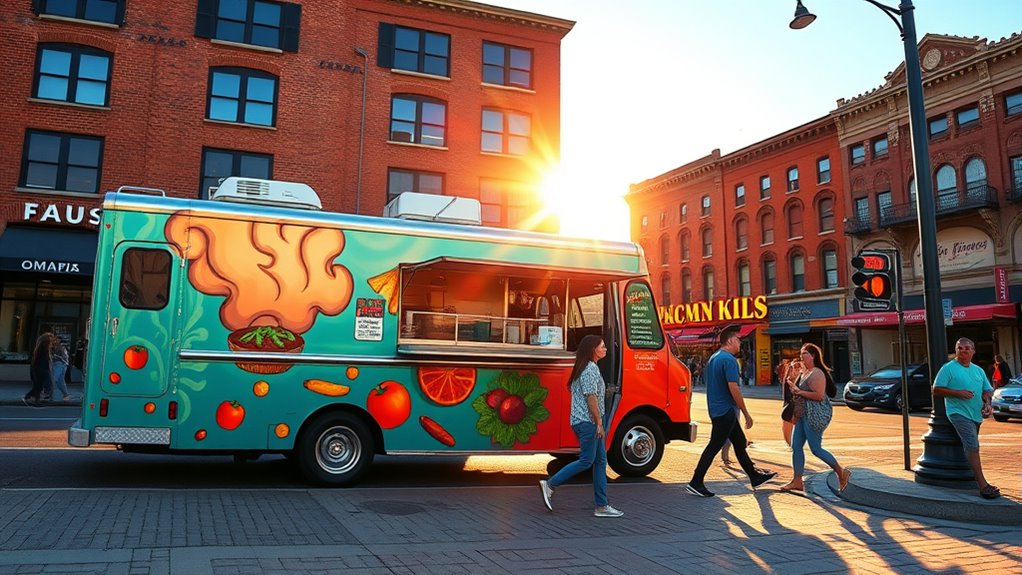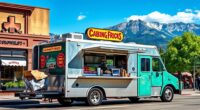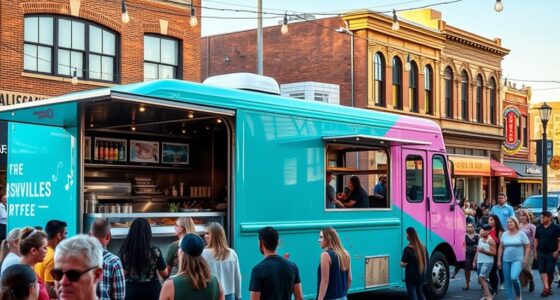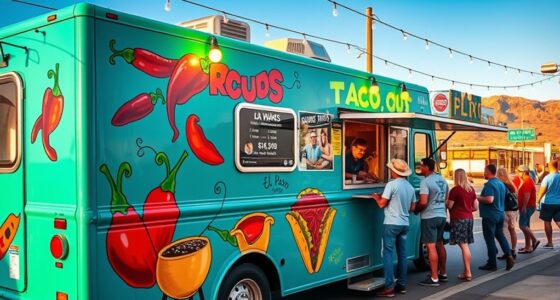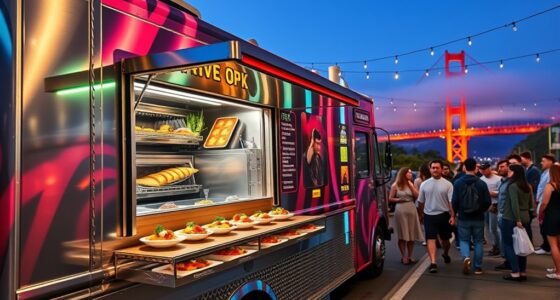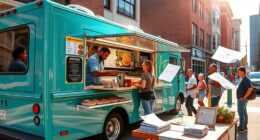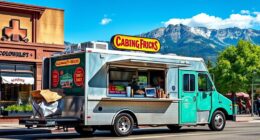To start a food truck in Omaha, NE, you need to secure the right permits, licenses, and health inspections through Omaha’s online portal. Focus on creating a unique menu with local ingredients and a strong brand. Find a compliant shared kitchen, plan your budget carefully, and get insurance. Use technology for efficient operations and engage with the community through social media and local events. Keep these steps in mind to build a thriving food truck business—more details await as you go forward.
Key Takeaways
- Obtain necessary permits and licenses through Omaha’s licensing portal and ensure health inspection compliance.
- Choose a compliant shared kitchen and secure proper equipment for food preparation.
- Develop a unique, locally inspired menu with innovative branding to stand out in Omaha’s vibrant food scene.
- Secure funding through local grants, vehicle financing, and cost-effective equipment options.
- Engage with the community via social media, festivals, and partnerships to build brand recognition and long-term growth.
Food Truck Industry Overview
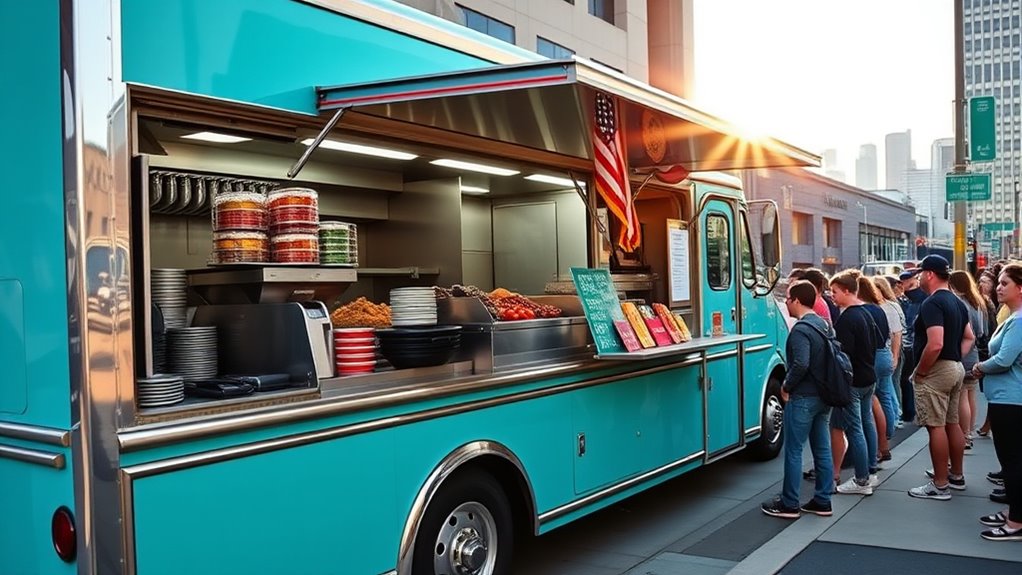
Are food trucks a viable business opportunity in Omaha, NE? Absolutely, but success hinges on smart food truck branding and menu innovation. The industry is booming, driven by consumers seeking unique, convenient dining options. To stand out, you need a strong brand identity that resonates locally and captures attention. Your menu should be innovative, offering fresh twists on familiar favorites or niche cuisines. Omaha’s vibrant food scene welcomes creative concepts, giving you room to experiment and attract loyal customers. Keep in mind, the industry is competitive, so differentiating yourself through compelling branding and inventive menu items is essential. Additionally, understanding cultural sensitivity can help tailor your offerings to diverse customer preferences. With the right approach, you can carve out a successful niche in Omaha’s bustling food truck market and enjoy sustainable growth.
Understanding Local Requirements

To get started, you’ll need to complete the online license application for your food truck. Make sure to review the health inspection checklist thoroughly to conform to all local standards. Additionally, familiarize yourself with designated food truck zones in Omaha to ensure you’re parking legally and efficiently. Understanding local regulations related to food presentation and safety can also help prevent potential issues.
Online License Application Process
Using Omaha’s online license application process is a straightforward way to get your food truck business up and running. To start, visit the city’s official licensing portal and create a digital account. The online license application allows you to submit all necessary documentation electronically, saving you time and effort. Make sure you gather and upload required information, such as your business details, proof of insurance, and any permits specific to food trucks. The digital application process provides real-time updates, so you can track your submission’s progress. Once your application is reviewed and approved, you’ll receive your license electronically, allowing you to operate legally in Omaha. Using the online license system simplifies compliance and helps you get on the road faster.
Health Inspection Checklist Tips
Understanding local health inspection requirements is essential to guarantee your food truck passes inspections smoothly. To prepare effectively, familiarize yourself with Omaha’s health inspection checklist tips. These tips help you stay compliant and avoid costly re-inspections.
- Make certain all surfaces are sanitized regularly and maintain proper cleaning schedules.
- Keep food storage organized, labeled, and at correct temperatures.
- Verify that handwashing stations are fully stocked and accessible.
- Track maintenance and pest control efforts diligently.
Designated Food Truck Zones
Knowing where you can legally operate your food truck is just as important as passing health inspections. Omaha has specific designated food truck zones you must follow, which helps avoid fines and permits issues. To do this, you need the right food truck permits and must understand parking regulations thoroughly. These zones are designated areas where mobile vendors are allowed to set up, often near busy districts or special events. Parking regulations also dictate how long you can stay in one spot and where you can park at different times of the day. Before launching, check with the city’s local regulations to identify approved zones and ensure your truck complies with all rules. Staying within these boundaries protects your business and keeps your operations smooth.
Setting Up Your Base of Operations
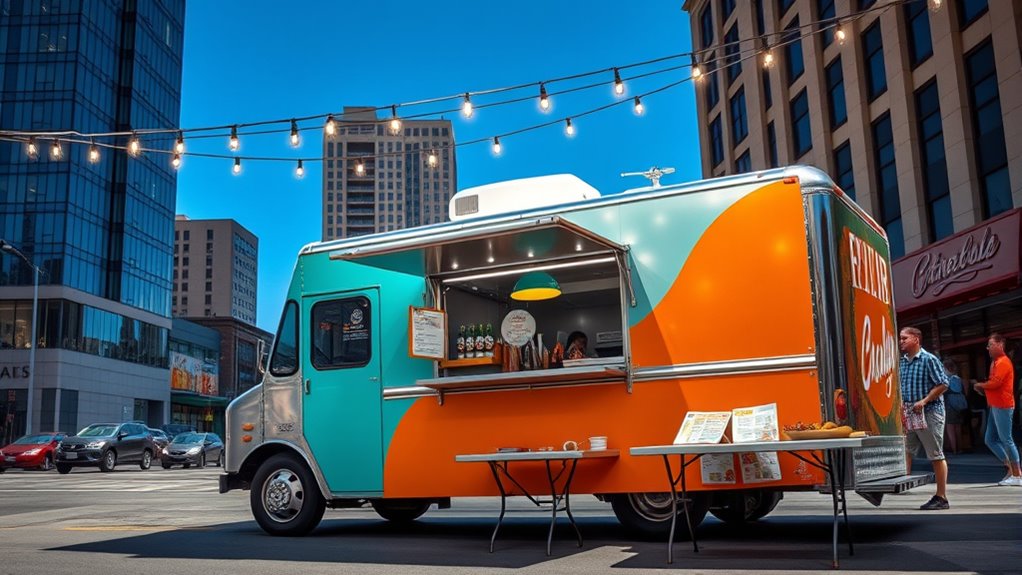
Choosing the right shared kitchen and understanding licensing requirements are essential steps to establish your base of operations. You’ll need to select custom kitchen equipment that meets local health standards and fits your menu. Getting these details right sets a solid foundation for your food truck business. Additionally, being aware of digital literacy programs can help you utilize online resources for permits and business management.
Shared Kitchen Licensing Requirements
Setting up your food truck in Omaha begins with securing the appropriate shared kitchen license, which is essential for operating legally and safely. This shared kitchen licensing guarantees your space meets health standards and complies with local regulations. To obtain your food truck certification, follow these steps:
- Verify that the shared kitchen is approved by local health authorities.
- Complete all required safety and sanitation inspections.
- Submit necessary documentation, including proof of ownership and insurance.
- Schedule and pass the inspection to obtain your food truck certification.
Custom Kitchen Equipment Selection
Selecting the right custom kitchen equipment is essential for ensuring your food truck operates efficiently and meets your specific menu needs. When choosing equipment, focus on durability, space efficiency, and functionality. Your custom kitchen should include essentials like a commercial stove, refrigeration units, prep tables, and cooking appliances tailored to your menu. Consider multi-purpose equipment to save space and increase efficiency. Proper equipment selection not only improves workflow but also guarantees compliance with health regulations. Think about your menu items and choose appliances that can handle your expected volume. Invest in quality, reliable equipment that can withstand the rigors of mobile food service. Making smart choices during equipment selection helps you set up a functional, efficient, and compliant custom kitchen for your Omaha food truck.
Budgeting and Financing Your Food Truck
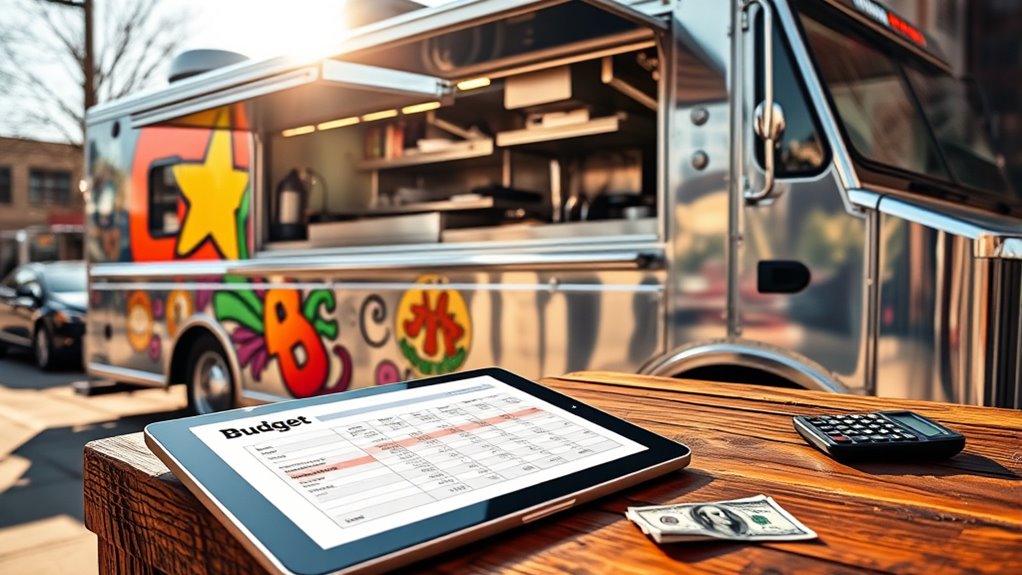
Getting your food truck off the ground starts with understanding your costs and funding options. You’ll need to contemplate the initial vehicle purchase, explore local grants, and prioritize essential insurance coverage. Knowing these key points helps you create a realistic budget and secure the right financing. Additionally, researching cost-effective equipment can help you save money while maintaining quality.
Initial Vehicle Purchase Costs
Purchasing your food truck is one of the biggest upfront costs you’ll face when starting in Omaha, NE. To manage this expense, consider your options for vehicle financing, which can help spread out payments. When negotiating the purchase, focus on securing the best deal possible and understanding the total cost. Here are four key points to keep in mind:
- Determine whether to buy new or used based on your budget and needs.
- Research the market value to strengthen your purchase negotiation.
- Explore financing options, including loans or leasing arrangements.
- Factor in additional costs like customization and equipment upgrades.
Local Food Truck Grants
If you’re looking to ease the financial burden of starting your food truck in Omaha, NE, exploring local grants can be a smart move. Many programs target small businesses and food entrepreneurs, helping cover costs like food truck design and equipment. Applying for these grants can free up funds that you might otherwise spend out of pocket, allowing you to invest in marketing and branding efforts. Once you secure funding, focus on developing a strong social media marketing strategy to attract customers and build buzz around your truck. Grants often require detailed budgets, so be prepared to justify expenses related to your vehicle, kitchen setup, and branding materials. Take advantage of local resources and networking opportunities to increase your chances of securing financial support for your food truck venture.
Commercial Vehicle Insurance Essentials
Securing the right commercial vehicle insurance is a vital step in budgeting and financing your food truck startup. It protects your investment and keeps your food truck branding intact. To make informed decisions, consider these essentials:
- Coverage Types – Confirm your policy includes liability, collision, and comprehensive coverage to handle potential accidents.
- Fleet Maintenance – Regular maintenance reduces risks, lowers premiums, and keeps your truck running smoothly.
- Budget Planning – Factor in insurance premiums as part of your startup costs to avoid surprises.
- Cost-Benefit Balance – Choose coverage that protects your assets without overspending, allowing funds for marketing and upgrades.
Proper insurance and maintenance work together to safeguard your business, helping you stay afloat in Omaha’s vibrant food scene.
Designing Your Menu and Pricing Strategy
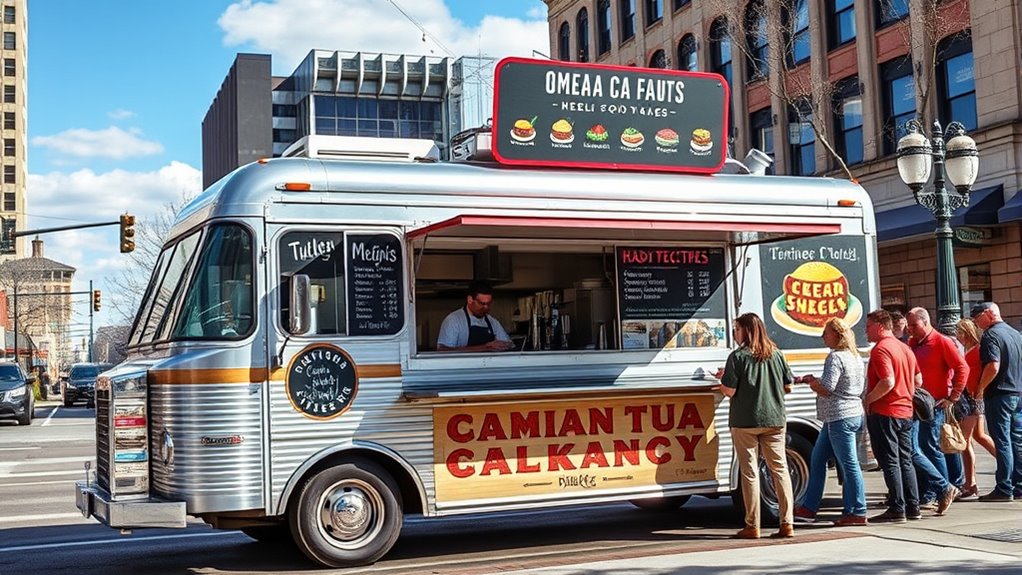
When designing your menu, consider incorporating locally sourced ingredients to appeal to Omaha’s community and support regional farmers. Balancing ingredient costs with quality helps you set prices that attract customers while maintaining profit margins. By implementing ingredient cost control strategies, you can keep your offerings affordable without sacrificing flavor. Incorporating authentic farmhouse aesthetic elements can also enhance the overall dining experience and attract a niche clientele interested in rustic, regional flavors farmhouse decor.
Locally Sourced Ingredient Integration
Incorporating locally sourced ingredients into your menu can set your food truck apart and appeal to health-conscious customers. To maximize this, focus on four key strategies:
- Prioritize seasonal menu planning to use ingredients at their peak freshness and flavor.
- Partner with local farmers to ensure a reliable supply of quality produce.
- Use sustainable packaging to reduce environmental impact and reinforce your commitment to local sourcing.
- Adjust prices based on seasonal availability, balancing affordability with fair compensation for producers.
Ingredient Cost Control Strategies
Designing your menu and setting prices thoughtfully can help control ingredient costs while maintaining quality and customer satisfaction. Focus on ingredient sourcing to find affordable, high-quality items without sacrificing freshness. Building strong relationships with local suppliers can give you better prices and reliable access to ingredients. Implement portion control measures to reduce waste and ensure consistency across servings. Use standardized measurements for ingredients to avoid overuse, which directly impacts costs. Streamlining your menu by offering popular, cost-effective dishes also helps manage expenses and simplifies inventory. Regularly review ingredient costs and adjust your menu and pricing accordingly to stay profitable. By carefully managing sourcing and portion control, you can maximize your food truck’s profitability while delivering delicious meals.
Technology and Operations
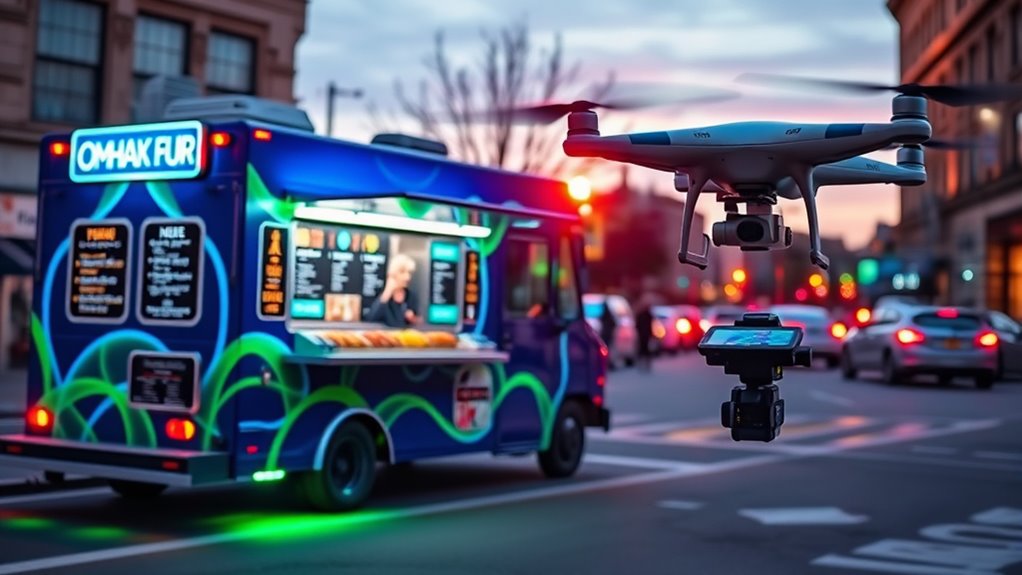
Implementing the right technology can streamline your food truck operations and improve customer experience. You can offer contactless payment options, making transactions faster and safer. Additionally, using mobile POS systems and stock tracking tools helps you stay organized and manage inventory efficiently.
Contactless Payment Options Available
Are you wondering how to make payments faster and more secure for your food truck customers? Contactless payments and digital wallets are the perfect solutions. They reduce wait times and improve customer satisfaction. To implement these options effectively:
- Choose a reliable contactless payment system compatible with digital wallets like Apple Pay and Google Pay.
- Train your staff on how to process contactless transactions smoothly.
- Promote the convenience of contactless payments to attract tech-savvy customers.
- Regularly update your hardware and software to guarantee security and compliance.
Mobile POS and Stock Tracking
Integrating mobile POS systems and stock tracking tools can streamline your food truck’s daily operations and enhance customer service. A mobile POS allows you to process orders quickly, accept multiple payment methods, and reduce wait times. Coupled with stock tracking software, you gain real-time visibility into inventory levels, helping you avoid shortages and overstocking. These tools work together to simplify order management and inventory control, saving you time and reducing errors. With mobile POS, you can also track sales data to identify popular menu items and optimize your offerings. Stock tracking ensures you’re always prepared for busy periods, minimizing waste. Implementing these technologies helps you run a more efficient, profitable food truck while providing a seamless experience for your customers.
Marketing and Growing Your Presence
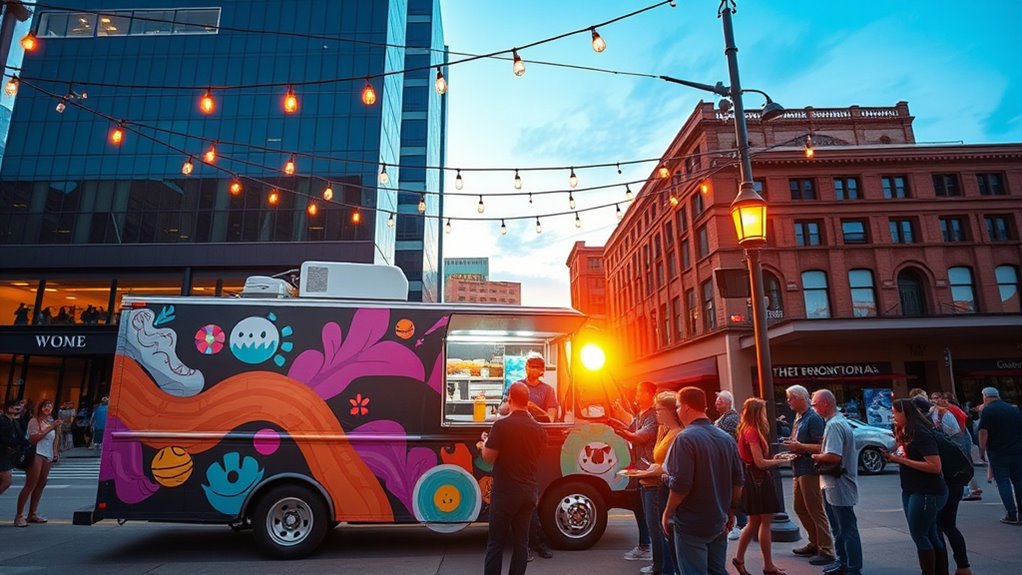
To build your presence in Omaha, NE, you should actively participate in popular food festivals to attract new customers and boost visibility. Implementing customer loyalty programs encourages repeat business and strengthens relationships. Combining these strategies helps you grow your food truck’s reputation and reach in the local community.
Popular Food Festivals Calendar
Staying ahead in the competitive Omaha food scene means marking your calendar with key food festivals throughout the year. These events boost your food truck branding and expand your reach. Participating regularly helps you connect with new customers and build your reputation. To maximize impact, consider these strategies:
- Schedule your appearances during peak festival seasons to increase visibility.
- Use social media marketing to announce your festival dates and showcase your dishes.
- Collaborate with organizers to get featured in promotional materials.
- Leverage festival opportunities to gather customer feedback and refine your offerings.
Customer Loyalty Programs
Implementing a customer loyalty program is one of the most effective ways to grow your food truck’s presence in Omaha. By offering customer rewards and loyalty incentives, you encourage repeat business and build stronger relationships with your customers. Consider creating a punch card system or a digital app that tracks purchases and rewards loyal patrons. When customers see tangible benefits, like discounts or free items after a certain number of visits, they’re more likely to return. Make sure your loyalty program is simple, easy to understand, and accessible. Promoting these rewards through social media and on-site signage helps attract new customers and keeps existing ones engaged. Ultimately, an effective loyalty program fosters a sense of appreciation, boosting your reputation and increasing your food truck’s visibility in Omaha.
Local Networking Opportunities Boost Success
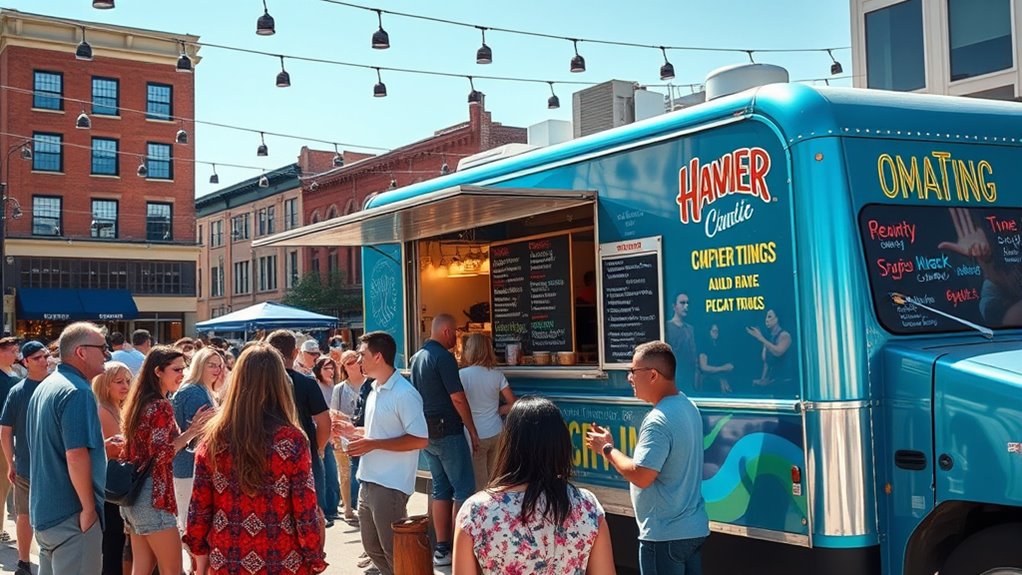
Networking opportunities in Omaha can markedly boost your food truck’s success by connecting you with local vendors, event organizers, and fellow entrepreneurs. Engaging in community events and leveraging social media helps you build relationships that open doors to new customers and partnerships. To maximize these benefits, consider:
- Attending local food festivals and markets to showcase your menu
- Joining Omaha’s business associations for support and collaboration
- Using social media to promote your participation in community events
- Partnering with other vendors for joint promotions and cross-marketing
These connections provide valuable insights, increase your visibility, and foster trust within the community. By actively participating, you create a network that sustains your food truck’s growth and long-term success in Omaha.
Frequently Asked Questions
What Permits Are Necessary for Operating a Food Truck in Omaha?
To operate a food truck in Omaha, NE, you need to obtain the proper food truck permits and meet licensing requirements. You’ll start by applying for a mobile food vendor permit through the Omaha Health Department, ensuring your truck passes health inspections. Additionally, you’ll need a business license and possibly other permits depending on your location and services. Make sure you stay updated on local regulations to keep your food truck compliant and running smoothly.
How Do I Find Reliable Food Truck Suppliers in Omaha?
You can find reliable food truck suppliers in Omaha by exploring various supplier options through local markets, online directories, and industry referrals. Use sourcing strategies like comparing prices, checking reviews, and requesting samples to guarantee quality. Reach out to other food truck operators for recommendations and attend local food expos or trade shows. This approach helps you build strong relationships with dependable suppliers, ensuring consistent ingredient quality for your food truck business.
What Are the Best Locations to Park My Food Truck in Omaha?
You should park your food truck in busy parking zones with high foot traffic, like downtown near the Old Market, or around event venues and parks. These spots attract more customers and boost sales. Also, consider areas near office buildings during lunch hours and popular neighborhoods on weekends. Regularly check local regulations to guarantee you’re parking legally, and adapt your locations based on customer flow to maximize your success.
How Can I Differentiate My Food Truck From Competitors Locally?
To stand out locally, focus on creating unique branding that captures your food truck’s personality and appeals to your target audience. Develop signature dishes that distinguish you from competitors, making your menu memorable. Use eye-catching signage, consistent visuals, and engaging social media to build recognition. Offering exceptional customer service and seasonal specials also helps build loyalty. With these strategies, you’ll carve out a distinct presence in Omaha’s vibrant food scene.
Are There Any Upcoming Food Truck Festivals or Events in Omaha?
Yes, Omaha hosts several upcoming food truck festivals and events you should check out. These Omaha events, like the annual Food Truck Festival and summer street fairs, provide great opportunities to showcase your unique offerings. Participating in food truck festivals helps you connect with local customers and stand out from competitors. Keep an eye on Omaha event calendars and social media for dates and details to plan your attendance effectively.
Conclusion
Starting a food truck in Omaha is like planting a seed—you’ll need the right planning, passion, and persistence to grow. By understanding local rules, crafting a tempting menu, and making connections, you’ll set yourself up for success. Stay adaptable and keep your eyes on the prize. With dedication, your food truck can thrive in Omaha’s vibrant scene, turning your culinary dreams into a flavorful reality—like a well-seasoned dish, it all comes together perfectly.
